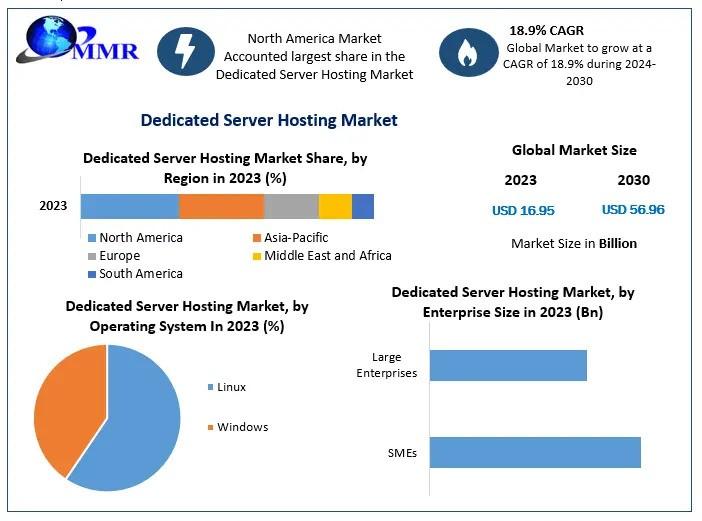
What to look for when selecting a dedicated server
Choosing a dedicated server is about striking the balance between component criteria and vendor criteria. The critical components to consider include processing power, storage, network performance, and the operating system. But, beyond the component level, it’s super important to factor in an assessment of the infrastructure provider deploying these components – after all, not all vendors are made equal, and you’ll need the expertise of a reliable hosting partner in order to maximize the capabilities of any physical components.
We’ve selected the five most important factors to research when choosing a dedicated server. Focusing on these five key criteria will help you find the best dedicated server and hosting provider for you.
1. CPU
Typically, the first thing people will look for when selecting a dedicated server is the central processing unit (CPU). There are two major CPU vendors: Intel and AMD. At present, Intel is the market leader enjoying a 71% market share while AMD holds a 20% market share.
Though this sounds like a huge discrepancy, it’s worth mentioning that until recently Intel dominated the market even more aggressively. The closing of the gap (albeit small for now) reflects a period of renewed product development by AMD and the competition between the two remains very much alive.
Vendor choice is usually the first thing people will think about. But for most workloads, whether a CPU is made by Intel or AMD doesn’t make much difference since both use the same x86 architecture. So, whilst it’s okay to have a CPU in mind, the best approach is to work with your hosting provider. Opting for the CPU model that your vendor already purchases will almost always be more affordable (not to mention that you’ll also benefit from their expertise).
Aside from vendor choice, the three critical factors to consider when choosing a CPU include the number of cores, max turbo frequency, and thread number.
Number of cores
The first CPUs were single-core meaning they could process one piece of information at a time. Single core CPUs are powerful but cannot execute multiple computations simultaneously. Enter dual-core CPUs, which could do just that. Now, instead of having one core on the physical CPU socket there are two. Today, multi-core CPUs are standard and processors with upwards of 64 cores are not uncommon. The benefit of multi-core isn’t that the cores are more powerful (in fact the more cores a CPU possesses the lower the frequency of each), but workloads can be spread out across cores in a process called multithreading.
The number of cores needed is determined by individual use cases. Even though multi-core processors can handle heavier workloads, some use-cases (e.g., bullet trajectories in a video game) can only take advantage of single cores. In these cases, it’s the performance of a single core, as opposed to the number of cores that counts. Ultimately it comes down to weighing up what’s more important to your application. A high-frequency CPU or multithreading?
Max-turbo frequency
Max turbo frequency is defined by Intel as “the frequency a CPU targets when stressed by a demanding application like a game.” Every CPU will have a baseline frequency, but most will be able to exceed this, within the manufacturer’s guidelines. Max turbo frequency is the maximum single-core frequency that any CPU can achieve without overclocking (increasing frequency beyond the factory default).For example, a CPU with a base frequency of 3.8GHz might actually have the power to reach a significantly higher ‘max turbo frequency’ of 5GHz. This is an important consideration when choosing a CPU as it allows the processor to use less power when under lower stress which, in turn reduces heat.
Hyperthreading
It’s also worth checking whether hyperthreading is enabled on the CPU. Hyperthreading improves processor performance so that more resource intensive apps can be run simultaneously. Hyperthreading works by breaking up a single physical processor into two virtual processors, allowing more than one thread to run on a single core and each core to run two actions simultaneously. Multithreading takes this one step further – allowing multiple threads to be run concurrently.
2. RAM and storage
Other important considerations when choosing a dedicated server include the Random Access Memory (RAM) and storage. RAM is essentially the server’s short-term memory – where the server stores data for fast retrieval. The more RAM available the faster your dedicated server will perform.
Long-term storage is a bit different and involves the storage of data on Direct-Attached Storage (DAS) devices such as hard disk drives (HDD) and solid-state drives (SSD). Both RAM and storage are defined by the CPU. CPUs generally have a maximum provision for RAM and storage and, usually, your infrastructure provider will offer a base amount of RAM and storage that can be adjusted up to the physical limitations of the CPU and server.
3. Network
Network performance is defined by bandwidth (the amount of data transmitted across a given period of time) and latency (the time taken for a packet of data to travel from one point on a network to another). A dedicated server with a low bandwidth limit and high latency will struggle to handle large numbers of simultaneous data transfers or requests, resulting in slower overall performance and potential downtime. A high performance server will have high bandwidth and low latency. For dedicated servers the standard configuration is a network speed of 1Gbps for single-socket servers and 10Gbps for anything above that.
4. Operating system
Finally, it’s advisable to check which operating systems any potential hosting provider can provision on your dedicated server. Most high performance servers are suitable for Windows or an iteration of Linux. At this stage, make sure that your vendor supports the operating system and version of that operating system that you require.
But the type of operating system isn’t the only consideration. The age of the operating system is also an important consideration. Newer generations of operating systems are less likely to work effectively on older versions of hardware and, vice versa, older generations of operating systems are less likely to work effectively on newer versions of hardware.
So, it’s incredibly important to work with your hosting provider on this to find an optimized solution. Much like CPU, the type of operating system and the generation of the operating system required will depend heavily on individual user cases. Depending on the operating system you want to run, the best dedicated server for you won’t necessarily be the newest.
5. Open dialogue with your hosting provider
All the server components we’ve just discussed are undeniably important. But thinking in terms of component criteria alone can lead to poor purchasing decisions. When shopping around for the best dedicated server, it can be tempting to make like-for-like comparisons between vendors based on these components without considering the potential for variation in the quality and performance of components across providers.
Sure, the same AMD or Intel CPU should offer a standardized level of performance. But what people all too often forget is that if the CPU is deployed in a data center environment that it’s not designed for, it’s not going to work to its full capacity. Likewise, budget suppliers will sometimes cut corners when it comes to quality of storage drives, networking, and connection capacities which can lead to service disruption and packet loss.
For these reasons one of the most important factors to consider when choosing a high performance server is a strong relationship with your infrastructure provider. Your hosting provider should partner with you to identify, execute, and achieve your unique business goals.
Servers dedicated to your business
Infrastructure is the essential foundation behind any business. And for many platforms, choosing high performance dedicated servers offers the best combination of speed, growth, customization, and security. Having servers dedicated to your business is ideal for platforms looking for faster application speeds, best-in-class security, and the flexibility to customize your infrastructure at a more granular level.
Contact our team today to discuss your unique infrastructure requirements.
https://www.servers.com/news/blog/why-you-need-high-performance-dedicated-servers-for-your-business






